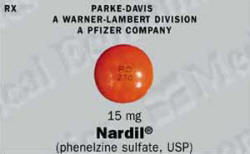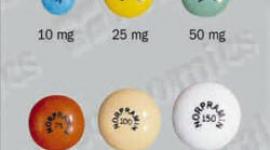Nardil (Phenelzine) Patient Information
Find out why Nardil (Phenelzine) is prescribed, side effects of Nardil, Nardil warnings, effects of Nardil during pregnancy, more - in plain English.
Generic name: Phenelzine sulfate
Brand name: Nardil
Pronounced: NAHR-dill
Full Nardil (Phenelzine) Prescribing Information
Why is Nardil prescribed?
Nardil is a monoamine oxidase (MAO) inhibitor used to treat depression as well as anxiety or phobias mixed with depression. MAO is an enzyme responsible for breaking down certain neurotransmitters (chemical messengers) in the brain. By inhibiting MAO, Nardil helps restore more normal mood states. Unfortunately, MAO inhibitors such as Nardil also block MAO activity throughout the body, an action that can have serious, even fatal, side effects--especially if MAO inhibitors are combined with other foods or drugs containing a substance called tyramine.
Most important fact about Nardil
Avoid the following foods, beverages, and medications while taking Nardil and for 2 weeks thereafter:
Beer (including alcohol-free or reduced-alcohol beer)
Caffeine (in excessive amounts)
Cheese (except for cottage cheese and cream cheese)
Chocolate (in excessive amounts)
Dry sausage (including Genoa salami, hard salami, pepperoni, and Lebanon bologna)
Fava bean pods
Liver
Meat extract
Pickled herring
Pickled, fermented, aged, or smoked meat, fish, or dairy products
Sauerkraut Spoiled or improperly stored meat, fish, or dairy products
Wine (including alcohol-free or reduced-alcohol wine)
Yeast extract (including large amounts of brewer's yeast)
Yogurt
- Medications to avoid:
Amphetamines, Appetite suppressants such as Redux and Tenuate, Antidepressants and related medications such as Prozac, Effexor, Luvox, Paxil, Remeron, Serzone, Wellbutrin, Zoloft, Elavil, Triavil, Tegretol, and Flexeril, Asthma inhalants such as Proventil and Ventolin, Cold and cough preparations including those with dextromethorphan, such as Robitussin DM, Hay fever medications such as Contac and Dristan, L-tryptophan-containing products, Nasal decongestants in tablet, drop, or spray form such as Sudafed, Sinus medications such as Sinutab
Taking Nardil with any of the above foods, beverages, or medications can cause serious, potentially fatal, high blood pressure. Therefore, when taking Nardil you should immediately report the occurrence of a headache, heart palpitations, or any other unusual symptom. In addition, make certain that you inform any other physician or dentist you see that you are currently taking Nardil or have taken Nardil within the last 2 weeks.
How should you take Nardil?
Nardil may be taken with or without food. Take it exactly as prescribed. It can take up to 4 weeks for the drug to begin working.
Use of Nardil may complicate other medical treatment. Always carry a card that says you take Nardil, or wear a Medic Alert bracelet.
--If you miss a dose...
Take it as soon as you remember. If it is within 2 hours of your next dose, skip the one you missed and go back to your regular schedule. Do not take 2 doses at once.
--Storage instructions...
Store at room temperature.
What side effects may occur when taking Nardil?
Side effects cannot be anticipated. If any develop or change in intensity, inform your doctor as soon as possible. Only your doctor can determine if it is safe for you to continue taking Nardil.
-
More common side effects of Nardil may include: Constipation, disorders of the stomach and intestines, dizziness, drowsiness, dry mouth, excessive sleeping, fatigue, headache, insomnia, itching, low blood pressure (especially when rising quickly from lying down or sitting up), muscle spasms, sexual difficulties, strong reflexes, swelling due to fluid retention, tremors, twitching, weakness, weight gain
-
Less common or rare side effects may include: Anxiety, blurred vision, coma, convulsions, delirium, exaggerated feeling of well-being, fever, glaucoma, inability to urinate, involuntary eyeball movements, jitteriness, lack of coordination, liver damage, mania, muscular rigidity, onset of the mental disorder schizophrenia, rapid breathing, rapid heart rate, repetitious use of words and phrases, skin rash or lupus-like disease, sweating, swelling in the throat, tingling sensation, yellowed skin and whites of eyes
Why should Nardil not be prescribed?
You should not take this drug if you have pheochromocytoma (a tumor of the adrenal gland), congestive heart failure, or a history of liver disease, or if you have had an allergic reaction to it.
You should not take Nardil if you are taking medications that may increase blood pressure (such as amphetamines, cocaine, allergy and cold medications, or Ritalin), other MAO inhibitors, L-dopa, methyldopa (Aldomet), phenylalanine, L-tryptophan, L-tyrosine, fluoxetine (Prozac), buspirone (BuSpar), bupropion (Wellbutrin), guanethidine (Ismelin), meperidine (Demerol), dextromethorphan, or substances that slow the central nervous system such as alcohol and narcotics; or if you must consume the foods, beverages, or medications listed above in the "Most important fact about this drug" section.
Special warnings about Nardil
You must follow the food and drug limitations established by your physician; failure to do so may lead to potentially fatal side effects. While taking Nardil, you should promptly report the occurrence of a headache or any other unusual symptoms.
If you are diabetic, your doctor will prescribe Nardil with caution, since it is not clear how MAO inhibitors affect blood sugar levels.
If you are taking Nardil, talk to your doctor before you decide to have elective surgery.
If you stop taking Nardil abruptly, you may have withdrawal symptoms. They may include nightmares, agitation, strange behavior, and convulsions.
Possible food and drug interactions when taking Nardil
If Nardil is taken with certain other drugs, the effects of either could be increased, decreased, or altered. It is important that you closely follow your doctor's dietary and medication limitations when taking Nardil. Consult the "Most important fact about this drug" and "Why should this drug not be prescribed?" sections for lists of the foods, beverages, and medications that should be avoided while taking Nardil.
In addition, you should use blood pressure medications (including water pills and beta blockers) with caution when taking Nardil, since excessively low blood pressure may result. Symptoms of low blood pressure include dizziness when rising from a lying or sitting position, fainting, and tingling in the hands or feet.
Special information if you are pregnant or breastfeeding
The effects of Nardil during pregnancy have not been adequately studied. Nardil should be used during pregnancy only if the benefits of therapy clearly outweigh the potential risks to the fetus. If you are pregnant or plan to become pregnant, inform your doctor immediately. Nursing mothers should use Nardil only after consulting their physician, since it is not known whether Nardil appears in human milk.
Recommended dosage for Nardil
ADULTS
 The usual starting dose is 15 milligrams (1 tablet) 3 times a day. Your doctor may increase the dosage to 90 milligrams per day. It may be 4 weeks before the drug starts to work.
The usual starting dose is 15 milligrams (1 tablet) 3 times a day. Your doctor may increase the dosage to 90 milligrams per day. It may be 4 weeks before the drug starts to work.
Once you have had good results, your doctor may gradually reduce the dose, possibly to as low as 15 milligrams daily or every 2 days.
OLDER ADULTS
Because older people are more likely to have poor liver, kidney, or heart function, or other diseases that could increase the likelihood of side effects, a relatively low dose of Nardil is usually recommended at the start.
CHILDREN
Nardil is not recommended, since safety and efficacy for children under the age of 16 have not been determined.
Overdosage of Nardil
Any medication taken in excess can have serious consequences. An overdose of Nardil can be fatal. If you suspect an overdose, seek medical help immediately.
- Symptoms of a Nardil overdose may include: Agitation, backward arching of the head, neck, and back, cool, clammy skin, coma, convulsions, difficult breathing, dizziness, drowsiness, faintness, hallucinations, high blood pressure, high fever, hyperactivity, irritability, jaw muscle spasms, low blood pressure, pain in the heart area, rapid and irregular pulse, rigidity, severe headache, sweating
Full Nardil (Phenelzine) Prescribing Information
Detailed Info on Signs, Symptoms, Causes, Treatments of Depression
Detailed Info on Signs, Symptoms, Causes, Treatments of Anxiety Disorders
APA Reference
Staff, H.
(2009, January 3). Nardil (Phenelzine) Patient Information, HealthyPlace. Retrieved
on 2026, March 4 from https://www.healthyplace.com/other-info/psychiatric-medications/nardil-phenelzine-patient-information
